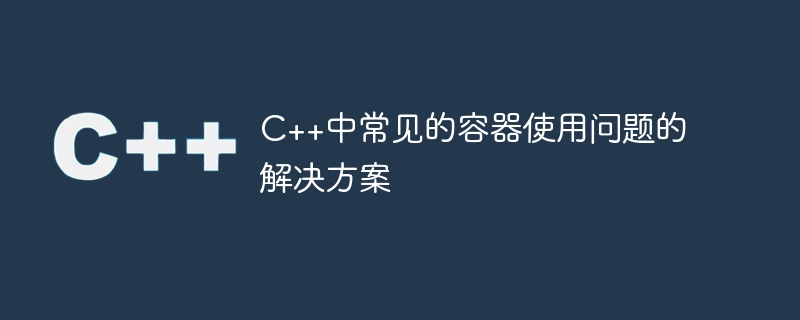

Solutions to common container usage problems in C
Introduction:
C, as a widely used programming language, provides a rich set of container classes. Such as vector, list, map, etc., used to store and operate data. However, the use of containers is often accompanied by some problems, such as iterator failure, memory leaks, etc. This article provides solutions to these common container usage problems and provides specific code examples.
1. The problem of iterator failure
Sample code:
vector<int> nums = {1, 2, 3, 4, 5};
vector<int>::iterator it = nums.begin();
while (it != nums.end()) {
if (*it % 2 == 0) {
it = nums.insert(it, 0); // 在偶数之前插入0
++it; // 将迭代器移到下一个元素位置
}
++it;
}
for (int num : nums) {
cout << num << " ";
}2. Memory leak problem
Sample code:
vector<int*> ptrs;
for (int i = 0; i < 10; ++i) {
int* ptr = new int(i);
ptrs.push_back(ptr);
}
// 释放动态分配的内存
for (int* ptr : ptrs) {
delete ptr;
}
ptrs.clear(); // 清空容器3. Container application scenario selection problem
Sample code:
vector<int> vec = {1, 2, 3, 4, 5};
vec.push_back(6); // 在数组末尾插入6
vec.pop_back(); // 删除数组末尾的元素
list<int> lst = {1, 2, 3, 4, 5};
lst.push_front(0); // 在链表头部插入0
lst.pop_front(); // 删除链表头部的元素
map<string, int> scores;
scores["Alice"] = 90; // 插入键值对
scores["Bob"] = 80;
scores.erase("Alice"); // 删除键值对Conclusion:
When using C containers, we need to pay attention to the problems of iterator invalidation and memory leaks, and choose the appropriate container according to actual needs . Through reasonable use and understanding of the nature of containers, the efficiency and maintainability of the program can be better optimized.
This article provides solutions to the problems of iterator failure and memory leaks, and gives specific code examples, hoping to help readers better understand and use C containers.
The above is the detailed content of Solutions to common container usage problems in C++. For more information, please follow other related articles on the PHP Chinese website!




